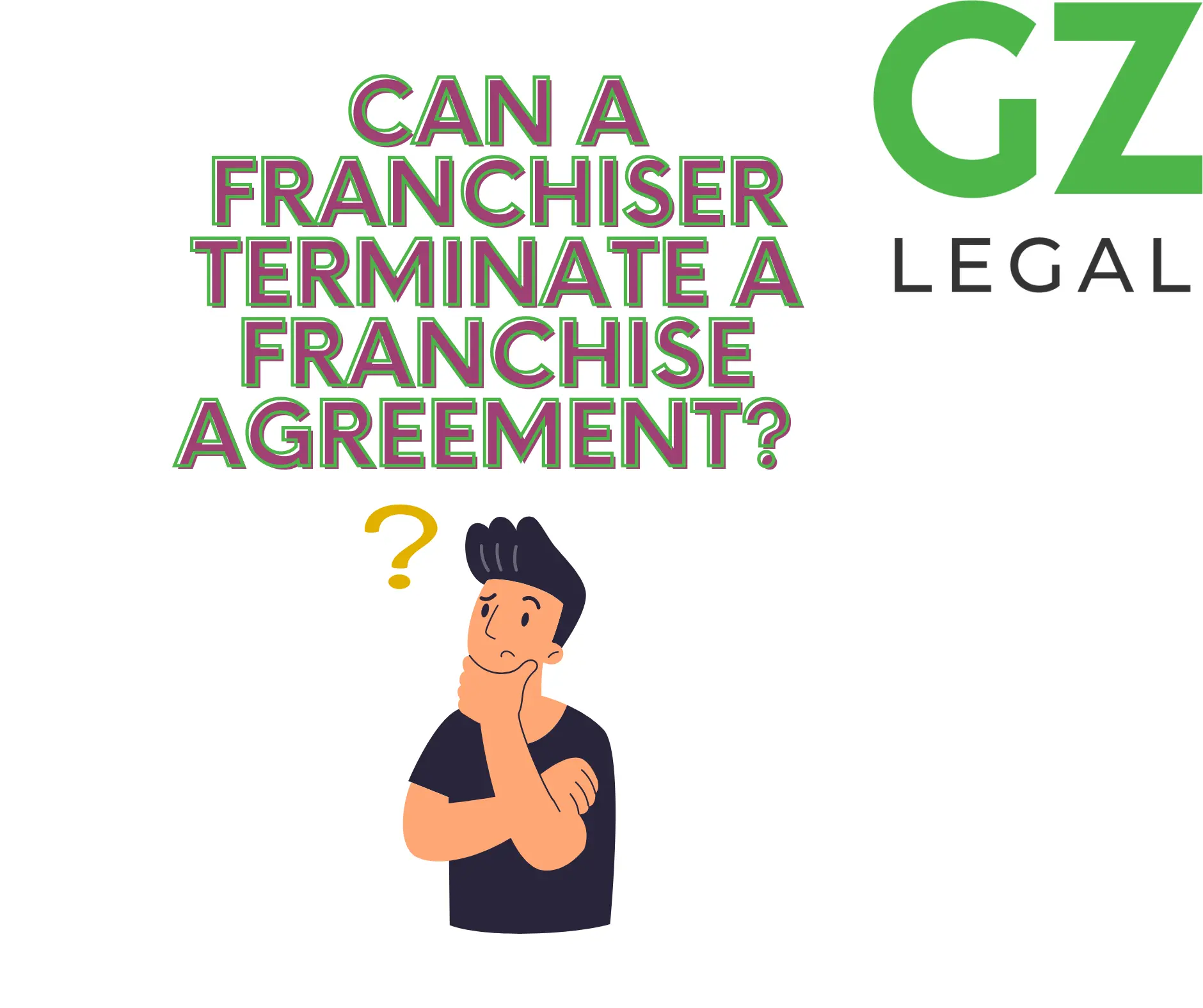Malcolm ZoppiSun Oct 15 2023
Can a Franchisor Terminate a Franchise Agreement? Examining Key Factors
A franchisor can terminate a franchise agreement if the franchisee fails to meet contractual obligations.
Can a Franchisor Terminate a Franchise Agreement? Examining Key Factors

Entering into a franchise agreement can be a profitable venture for both the franchisor and the franchisee. However, there might be situations where one or both parties wish to terminate the agreement. The question of whether a franchisee terminate a franchisor can terminate a franchise agreement is an important one to consider, as it may carry significant legal and financial implications.
Franchise agreements often contain specific provisions outlining the conditions under which they can be terminated. Franchisors have the right to terminate the agreement if a franchisee fails to meet the strict requirements and obligations laid out in the contract. This can include failure to pay royalties, breach of contract, or if the franchisee files for bankruptcy. It is essential for both franchisors and franchisees to fully understand their rights and responsibilities when it comes to terminating a franchise agreement.
Key Takeaways
- A franchisor can terminate a franchise agreement if the franchisee fails to meet contractual obligations.
- Termination carries legal and financial implications for both parties.
- Understanding one’s rights and responsibilities is crucial in franchise agreements.
Understanding Franchise Agreement Termination
As you navigate the world of franchise agreements, it is essential to grasp the concept common law of termination and its implications. Termination of a franchise agreement can occur under various circumstances initiated by either the franchisor or franchisee.
A common reason for termination of franchise early is the expiration of the agreed-upon term. Franchise agreements usually last for a fixed term, such as five years or more, and when this term ends, both parties have the option to renew or terminate the agreement.
When a franchisor terminates the agreement, it is generally due to the breach of contractual obligations by the franchisee. Such breaches may include non-payment of fees, failure to maintain brand standards, or unauthorised changes to the business model. In all such termination cases, the franchisor must provide a written termination notice, to the franchisee, outlining the reasons for termination and offering an opportunity to rectify the situation within a specified period. If the franchisee fails to remedy the breach, the franchisor has the right to terminate the agreement.
Similarly, if a franchisee’s failure or franchisor breaches their contractual obligations, the franchisee may also have the right to terminate the agreement. These breaches can include failing to provide adequate support, imposing unreasonable changes on the business, or misrepresenting the potential profitability of the venture. In this scenario, the franchisee must follow a similar process of notifying the franchisor and allowing them time to address the issue before pursuing automatic right of termination.
Another situation in which termination may occur is when both parties mutually agree to end the agreement. This can happen when the franchisor and franchisee determine that their partnership is no longer beneficial or sustainable, for example, due to changes in the market or overall business direction.
In any case, it is always crucial for you to be aware of your rights and obligations under the franchise agreement. This knowledge allows you to better manage your franchise business while also protecting yourself from potential disputes and legal ramifications.
Actions Leading to Termination

Breach of Contract
When a franchisee or franchisor fails to meet the agreed-upon terms in the franchise agreement, it is considered a breach of contract. Breaches can include failure to pay fees or royalties, not meeting performance standards, or acting in a manner that harms the brand. In such cases, franchisors may have the right to terminate the agreement after providing proper notice and an opportunity for the franchisee to rectify the issue. If the breach remains unresolved, termination may be unavoidable and could lead to further legal action, disputes and damages.
Franchisor Breach
Similarly, if a franchisor or other party fails to fulfil their obligations under the franchise agreement, such as providing adequate support or violating the terms, the franchisee may have the right to terminate the agreement. This process can be complex, as it often involves proving that the franchisor or other party’s actions have caused significant harm or loss to the franchisee. Consultation with legal experts is recommended in cases of franchisor breach.
Early Termination
Franchise agreements typically have a specified term. However, situations may arise where either the franchisor or the franchisee wishes to terminate the agreement before the agreed-upon term expires. For instance, the franchisor may have concerns regarding the franchisee’s performance or the franchisee may discover operating the business is not profitable. In such cases, both parties must carefully review the terms of the agreement and consider the consequences of early termination, which may include negotiation of an exit payment or the only can a franchisor terminate a franchise agreement by exercising their right to buy back the business.
Franchisee Termination
Although rare, there are situations where a franchisee may wish to terminate the agreement due to factors such as fraud, criminal activity, or loss of control over the franchisee’s failure or business. In these cases, the franchisee must provide solid evidence and potentially engage in litigation to dissolve the agreement. Termination may lead to disputes and financial drawbacks, making it vitally important for you uk franchise agreements to consult with legal professionals before taking such a step.
Engaging in open communication, dispute resolution processes, and consulting with legal experts can help you navigate the complexities of franchise agreement termination, whether you’re a franchisor or franchisee. These actions will aid in protecting your interests and ensuring a fair and reasonable outcome.
Legal Considerations and Support
Seeking Legal Advice
When considering the the termination clause of a franchise agreement, it’s crucial to seek professional legal advice. Consulting with solicitors specialising in franchise law can help you understand the termination clause within your legal document, and guide you on whether you have valid grounds for terminating the agreement. This advice will also help you manage potential claims, compensation, or legal actions while ensuring you comply with relevant laws and regulations.
Understanding Court Proceedings
In some cases, terminating a franchise agreement may lead to court proceedings, especially if the parties cannot reach an amicable settlement. Should this happen, it’s essential to have a clear understanding of legal processes, such as the submission of a defence, disclosure of documents, and attendance of witness statements. Your solicitor will provide you with the necessary support and guidance throughout the litigation process, helping you make informed decisions and manage potential disputes.
Intellectual Property Issues
Finally, intellectual property issues can arise during the termination of a franchise agreement. Franchises often involve licences and permits relating to intellectual property, such as trademarks and patents. Terminating the agreement may result in changes to these licences and permits. It’s essential to understand the implications and potential consequences of these changes on both your business operations and legal standing.
In conclusion, when considering the termination of a franchise agreement, seeking legal advice, understanding court proceedings, and being aware of your intellectual property rights payment obligations and issues are all crucial aspects for ensuring a smooth and legally compliant process. Remember to consult with solicitors specialising in franchise law and remain informed throughout the process to protect your interests and minimise potential disputes.
Financial Implications
Assessing Compensation Claim
When considering potential options for the termination of a franchise agreement, financial implications such as compensation claims should be carefully considered and assessed. If a franchisor terminates the agreement unfairly or without proper cause, the franchisee may have the right to claim compensation. In such cases, you will need to calculate the potential losses incurred by the franchisee, which may include lost profits, investments made, and any other expenses related to the franchise operation.
As a franchisor, it is crucial to obtain legal advice before deciding on the termination to minimise the risk of successful compensation claims. This includes understanding any applicable laws, clauses in the franchise agreement, and obligations towards the franchisee. It may also be helpful to attempt resolution through negotiation or mediation before reaching the stage of termination.
Understanding Franchise Fees
Terminating a franchise agreement will also have an impact on franchise fees, which consist of the initial fees, ongoing fees, and royalties. As a franchisor, you must be thorough in understanding the implications of terminating an agreement on these fees.
The initial fees are typically non-refundable, even in the case of termination, and cover the setup costs such as business establishment, training, and support. However, depending on the terms of the franchise agreement and the reason for termination, you may need to partially refund this fee to the franchisee.
Ongoing fees are used to cover the support services you provide to your franchisees, such as marketing, technology, and training. The termination of the agreement usually ends your obligation to provide such services, and consequently, the franchisee’s obligation to pay ongoing fees ceases.
Royalties represent the percentage of the franchisee or franchisor’s intellectual property and revenue that the franchisor collects. Upon termination, the franchisee usually stops paying these royalties, which can impact the franchisor’s income. It is essential to consider this loss of revenue and how it will affect your overall business operations.
By understanding the financial implications associated with terminating a franchise agreement, you can make informed decisions and mitigate any potential risks while maintaining a professional and ethical approach.
Opportunities for Rectification

When a franchisee breaches the terms of the franchise agreement, it is important to understand that there are opportunities for rectification before the franchisor opts for termination. In many cases, both parties benefit from providing reasonable time and notice for the franchisee to remedy the alleged breach.
Firstly, it is crucial to recognise when a breach occurs. As a franchisor, you should closely monitor your franchisees’ operations and adherence to the franchise agreement. Addressing issues as they arise demonstrates a proactive and committed approach to maintaining successful relationships with your franchise partners.
Upon identifying a breach, you should provide your franchisee with reasonable notice of the issue. This notice should be clear, concise, and outline the specific terms that have been violated. By doing so, you set a clear expectation of the corrections required, allowing your franchisee the opportunity to rectify the problem.
Once you have provided notice of material breach, it is essential to allow your franchisee adequate time to address and remedy the breach. The reasonable time given will depend on the nature of the breach and the complexity of the required solutions. It is in the best interest of both parties to allow for rectification, as termination of a franchise agreement can be costly and time-consuming.
During the rectification period, maintaining open communication with your franchisee is key. Offering guidance, support, or resources to assist the franchisee in resolving the breach shows a commitment to the partnership and can strengthen the relationship in the long run.
By sticking to a confident, knowledgeable, neutral, and clear tone, and offering opportunities for rectification when breaches occur, you promote a healthy franchisor-franchisee relationship. By providing a reasonable balance of notice and time to correct any violations, you can ensure that both parties maintain a strong, successful business partnership while avoiding the complications of terminating a franchise agreement.
Franchise Renewal, Exit and Buy Back
Understanding Renewal
When the franchise term approaches the end of its duration, you may have the option to renew the agreement. The renewal process typically requires you to review the terms of the original contract and negotiate any necessary changes. Keep in mind that the franchisor may have specific criteria that you need to meet to qualify for renewal. Be proactive and maintain a good relationship with the franchisor to ensure a smooth renewal process.
Planning an Exit
Exiting a franchise agreement can be a complicated process, depending on the contract terms and the circumstances under which you want to leave. To protect your interests, for example, it’s crucial that you understand your rights and responsibilities when planning an exit.
Start by reviewing the franchise agreement for any provisions regarding termination, such as an early termination clause or exit payment terms. Keep in mind that you may be required under most franchise agreements to pay an exit fee, which could include compensation for lost future profits on behalf of competing business or the franchisor.
If you’re considering selling your franchise, known as a franchise resale, ensure that you follow the proper process outlined in the agreement. This may include obtaining the franchisor’s approval, finding a qualified buyer and transferring all assets related to the franchise operation.
Exploring Buy Back Options
Some franchise agreements include a buy back clause, which gives the franchisor the option to purchase your franchise under certain conditions. This option can be beneficial for both parties, as it allows you to exit the agreement while providing the franchisor with an opportunity to regain control of and operate the franchise operation.
If you’re interested in pursuing a buy back, discuss the possibility with the franchisor and review the specific terms outlined in the agreement. Be prepared to negotiate the buy back terms, such as price and conditions, to reach a fair arrangement.
Remember that during any phase of the franchising relationship, it’s important to maintain open communication with the franchisor and to seek legal advice or professional advice when necessary to ensure a successful resolution.
Franchise Operation, Support, and Training
Considering Business Standards
When entering a franchise agreement, it’s important to consider business standards that you, as the franchisee, are expected to maintain. These may include operational procedures, marketing strategies, and guidelines to uphold the franchisor’s brand reputation. It’s crucial for you to familiarise yourself with these standards and implement them in your day-to-day business operations.
Assessing Level of Training
Training is essential for you and your staff when starting a franchise business. Before signing the agreement, it’s necessary to evaluate the level of training provided by the franchisor. The quality of training can have a direct impact on the success of your franchise. Ensure the training program covers vital aspects such as:
- Business operations
- Marketing techniques
- Sales strategy
- Customer service skills
Additionally, it’s advisable to consult with franchise lawyers to assess the adequacy of the training and any legal implications that may arise.
Understanding Support
Franchise support is key to your success as a franchisee. Prior to committing to a franchise agreement, take the time to understand the level of support and assistance provided by the franchisor. Examples of support to look for include:
- Ongoing training and development
- Marketing support
- Regular communication with the franchisor
- Access to a dedicated support team for operational and technical assistance
Keep in mind that the level of training and ongoing support you receive under most franchise agreements can significantly impact the way you effectively manage your franchise and adhere to the franchisor’s business standards. By understanding these aspects, you can make an informed decision on whether to become a franchisee and confidently navigate the franchise agreement process.
Frequently Asked Questions
What are the common grounds for terminating a franchise agreement?
There are several grounds for terminating a franchise agreement, including breach of contract, repudiatory breach, and mutual termination. Breach of contract occurs when one party fails to uphold the agreed-upon contractual terms, such as not meeting financial obligations. Repudiatory breaches are severe and significantly undermine the relationship between the franchisor and franchisee. Mutual termination happens when both parties agree to end the agreement, often with negotiated exit terms.
What are the consequences of a franchise agreement termination?
Terminating a franchise agreement can have various consequences for both parties. For the franchisee, it may mean losing the rights to operate the franchised business name, returning assets and intellectual property to the franchisor, and potentially facing financial penalties. The franchisor may experience financial loss or damage to their brand reputation if the relationship ends poorly. Both parties may need to find suitable replacements or adapt their businesses to accommodate the change.
Find out more!
If you want to read more in this subject area, you might find some of our other blogs interesting:
- Step-by-Step Guide on How to Transfer Shares to a Holding Company
- Breach of Settlement Agreement: Consequences and Remedies Explained
- Who Gets the Money When a Company is Sold?
- What is a Counter Offer in Contract Law? Explained Simply and Clearly
- Understanding the Costs: How Much Do Injunctions Cost in the UK?
Disclaimer: This document has been prepared for informational purposes only and should not be construed as legal or financial advice. You should always seek independent professional advice and not rely on the content of this document as every individual circumstance is unique. Additionally, this document is not intended to prejudge the legal, financial or tax position of any person.